04/10/2019- Tim Kowalewski Receives NSF CAREER Award
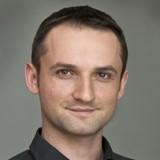
IEM Member Dr. Timothy M. Kowalewski, Assistant Professor of Mechanical Engineering, has received the National Science Foundation CAREER Award for his research "Scientific Foundations for Augmented Human Performance in Robotic Surgery." The prestigious award, which provides $500,000 in funding, is in support of junior faculty who exemplify their role through the integration of education and research. Dr. Kowalewski will study how skilled humans use handheld robots to accomplish precision manipulation tasks that demand speeds beyond typical human capabilities. The grant application leveraged IEM's annual Inspire Conference for educational outreach. Dr. Kowalewski's participation at IEM's Inspire Conference started last November, at which he delivered a talk to inspire high school students with his passion for the development of soft robots that have the potential to save lives.
04/10/2019- IEM Members named Distinguished McKnight University Professors
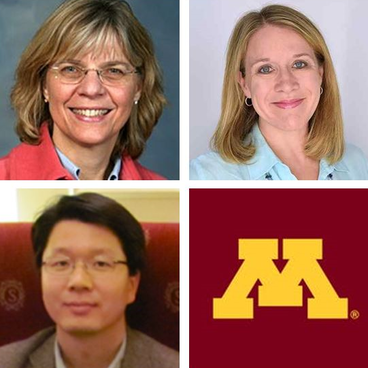
IEM Members Dr. Deborah A. Ferrington, Professor, Department of Ophthalmology and Visual Neurosciences, Dr. Christy L. Haynes, Associate Department Head and Professor in the Department of Chemistry, and Professor Sang-Hyun Oh, Sanford P. Bordeau Chair of Electrical and Computer Engineering, are among seven faculty members who have been named Distinguished McKnight University Professors, announced by the Office of the Executive Vice President and Provost. The Distinguished McKnight Professorship program recognizes outstanding faculty members who have recently achieved full professor status. Recipients hold the title "Distinguished McKnight Professor" for as long as they remain at the University of Minnesota.
04/10/2019- Sang-Hyun Oh Leads Research Team that Creates Graphene-Based Device which Could Lead to Improved Disease Diagnostics
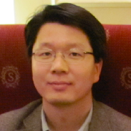
IEM Member Professor Sang-Hyun Oh, Sanford P. Bordeau Chair of Electrical and Computer Engineering, is the lead researcher of a team that has developed a graphene-based device which could lead to the development of ultrasensitive biosensors for improved diagnoses of diseases in both humans and animals. The team used a novel approach of developing a very flat base layer for the graphene by combining it with nano-sized gold ribbons, making it possible to view single layers of protein molecules. "In order to detect and treat many diseases we need to detect protein molecules at very small amounts and understand their structure," says Dr. Oh. "Currently, there are many technical challenges with that process. We hope that our device using graphene and a unique manufacturing process, will provide the fundamental research that can help overcome those challenges." The research, entitled "Graphene acoustic plasmon resonator for ultrasensitive infrared spectroscopy," was published in the journal Nature Nanotechnology.
04/10/2019- Roni Evans Appointed to NCCIH Advisory Council
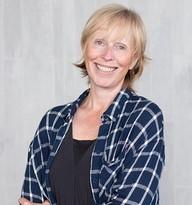
IEM Member Dr. Roni L. Evans, Research Associate Professor at the Earl E. Bakken Center for Spirituality & Healing, has been appointed to the National Advisory Council for Complementary and Integrative Health (NACCIH). The council serves as the principal advisory body to the National Center for Complementary and Integrative Health (NCCIH), which is part of the NIH, and the lead federal agency for research on complementary and integrative health. In an announcement of the appointment, Dr. Evans is described as having "extensive experience conducting randomized trials focused on the rigorous testing of complementary and integrative health interventions," including "several randomized clinical trials funded by NCCIH and the Health Resources and Services Administration." Dr. Evans' current research includes a study funded by the NCCIH to examine the enhancement of well-being and physical activity through the application of mindfulness.
04/10/2019- Research by Rita Perlingeiro & Colleagues Could Lead to New Treatments for Muscular Dystrophy
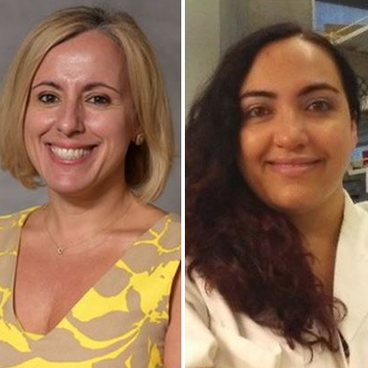
A research team supervised by IEM Member Dr. Rita Perlingeiro, Professor of Medicine/Cardiology, and included IEM Member Dr. Michael Kyba, Professor of Pediatrics, showed that in vitro-generated pluripotent stem cell-derived myogenic progenitors contribute to the repair of muscle wasting in dystrophic mice and importantly, contribute to the formation of new muscle stem cells that are more similar to the adult muscle stem cell counterparts. "We are the first lab that re-isolated the cells from the injected muscles and demonstrated that these cells change their molecular characteristics," says Dr. Tania Incitti, a postdoctoral associate in the laboratory of Dr. Rita Perlingeiro, who led the research. "It has been demonstrated that if we inject these cells into an animal model of Duchenne Muscular Dystrophy (DMD), it can regenerate new muscle." As reported by the Minnesota Daily, the findings could lead to new treatments for patients with muscular dystrophy. The research, entitled "Pluripotent stem cell-derived myogenic progenitors remodel their molecular signature upon in vivo engraftment" was recently published in the journal PNAS.
04/09/2019- Research Led by Hubert Lim & Bryce Binstadt Shows Potential of Ultrasound Stimulation of the Spleen as Possible Noninvasive Treatment for Arthritis
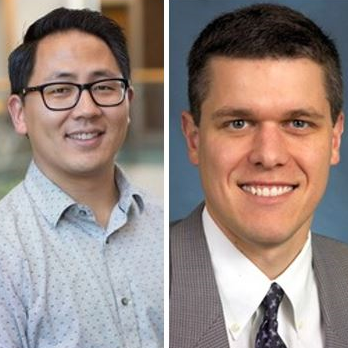
A research team led by IEM Member Dr. Hubert H. Lim, Associate Professor of Biomedical Engineering and Institute for Translational Neuroscience Scholar, showed that ultrasound stimulation of the spleen resulted in a significant reduction of joint swelling in mice with inflammatory arthritis, compared to mice that did not receive the treatment. The research, entitled "Noninvasive ultrasound stimulation of the spleen to treat inflammatory arthritis," and published in Nature Communications, also showed the promise of this alternative to invasive treatments using implantable devices. "Using noninvasive ultrasound stimulation of the spleen to treat a progressive disease like inflammatory arthritis seemed like a far-fetched idea," says Dr. Lim. "We were pleasantly surprised with our results and how a separate study, independently performed by GE Research and The Feinstein Institute for Medical Research published in the same issue of Nature Communications, showed findings that were consistent with our research." Dr. Bryce A. Binstadt, Associate Professor of Pediatrics, who served as a Co-Senior Author of the study, says "the idea that we can improve arthritis treatment by using ultrasound rather than additional medications is exciting. This research shows the progress we can make when doctors and engineers come together to solve problems."
05/25/2019- Research Led by David Odde and David Wood Shows that Lower Dosages of Medication Could Effectively Treat Sickle Cell Anemia
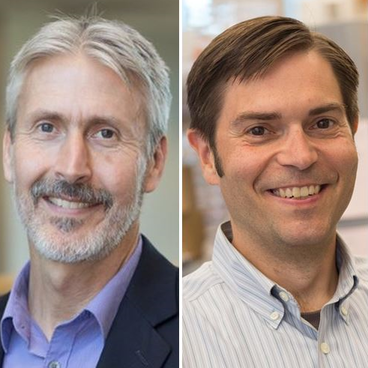
Research led by IEM Members Dr. David J. Odde, Professor of Biomedical Engineering, and Dr. David K. Wood, Associate Professor of Biomedical Engineering, shows that sickle cell anemia could be effectively treated with lower dosages of medication than are currently prescribed, due to the inefficiency of the disease's molecular development. "It would be analogous to saying: if I stacked up 100 Legos ... 96 of them would fall off and only four would stay on," says Dr. Wood. "I would have to stack up another 100 to get another four to stay. So [the molecular process is] only about 4 percent efficient." As reported by the Minnesota Daily, the findings were made possible by cameras and microscopes that allowed for the highest resolution ever used in studying the pace and efficiency of the disease on the molecular level. Dr. Wood notes that, while newer alternatives to existing medications are now in development to treat the disease, including stem cell transplants and gene therapy, those treatments will probably not be available to the millions of people in the developing world who suffer from the disease. "I would argue that ... a medication that they can take twice a day and that would basically prevent most of their symptoms might be the right answer."